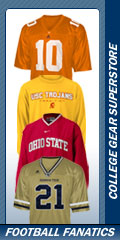 |
| SouthernCollegeSports.com |
| CONTACT SCS.com |
| SCS.com STORE |
| HOOPS FEATURES |
| TV Listings |
| HOOPS COLUMNS |
| Daniel |
| HOOPS LINKS |
| Live Scoreboard |
| Conference Standings |
| Top 25 Polls |
| FOOTBALL FEATURES |
| Free Pick'Em Contest |
| FOOTBALL COLUMNS |
| David |
| FOOTBALL LINKS |
| Live Scoreboard |
| Conference Standings |
| Top 25 and BCS Polls |
| Statistics |
| ABOUT US |
| The Work Force |
| Site Developed by AdcockDesign.com |
| PPD: COLD WEATHER AND ITS EFFECT ON NCAA BASEBALL | |
| April 12, 2007 | |
| Ryan, SCS.com Staff Writer | Contact Ryan |
 February in the South means warm, sunny weather and of course the start of college baseball season. However some colleges in colder climates to the north have to deal with the colder weather and the issues that come along with inclement elements. The college baseball season gets into full swing in early February when tempratures in the south are starting to rise into the 70's and 80's. But up north in Febuarary and March, winter is still in full swing up and snow as well as inclement weather is always a possibility.
February in the South means warm, sunny weather and of course the start of college baseball season. However some colleges in colder climates to the north have to deal with the colder weather and the issues that come along with inclement elements. The college baseball season gets into full swing in early February when tempratures in the south are starting to rise into the 70's and 80's. But up north in Febuarary and March, winter is still in full swing up and snow as well as inclement weather is always a possibility.
Many college programs in colder climates do not have a college baseball or softball team. Among those institutions that do not have college baseball programs are Colorado and Idaho. Idaho dropped their baseball program in 1980 due to a number of reasons.
"Baseball was dropped here in 1980 due to lack of competitive scheduling opportunities (it was not a conference sport in the Big Sky Conference, our conference affiliation at that time) and for budget reasons," said Maureen Taylor, assistant athletic director of University of Idaho. Taylor went on to say that the weather was not the primary factor for the Vandals not to have a baseball program. "Yes, weather was obviously a factor in practice and game cancellations, but WSU (Washington State) and other area teams in eastern Washington make that work, so that was not a primary factor." Taylor advised there are no plans at this time to add a softball or baseball team to the Vandals athletics program. She advised that Idaho did recently add women's swimming to their athletic program.
Michael Bohn, the former athletic director at Idaho and current athletic director at the University of Colorado, declined to comment on whether weather was a reason for both programs dropping college baseball from their athletic programs. Bohn simply stated that, "Financial considerations are the major hurdle in both the UI and CU cases. Both institutions have a rich baseball tradition."
Which brings us to another hurdle teams from the north have to face, the financial implications of participating in college baseball. Teams from the north are required to travel to fill out their 56 game schedule and will sometimes stay on the road for a week at a time. The cost of hotels, flights to and from games, and other costs such as food on these mulitple road trips add up pretty quickly. Teams do not rely solely on money from tickets sold to home games, but attendance to the few early games in March and rare Febuarary games are not turning the turn stile often enough, to say the least.
A baseball team is not only affected by weather during games, but they are also affected by it when preparing for them. Many squads have indoor batting cages to compensate but lack other opportunities such as fielding and throwing, as well inter-squad scrimmages. Most teams, like Minnesota State, have to adjust their training to the weather, like the Spartans do by throwing in the gym. The Minnesota Golden Gophers, on the other hand, are more fortunate than most and can play the beginning of their season in the Metrodome in Minneapolis.
Teams such as UCF in Orlando reap the benefits of the warm sunny weather year round. The Golden Knights were able to stay at home for a 17-game home stand that lasted almost a month in Febuaray and March. With most of UCF's opponents like Army, Rutgers and Michigan State play multiple games in consecutive days while in the sunshine state, the Knights - like most squads in the south - were able to stick to their regular schedule of a weekend series and a midweek game.
The universities that do have a college baseball program often have to alter their routines and play around the weather. Most colleges that have a baseball program play the first part of their season on the road. Teams will make trip after trip down south for the first month of the season, like Michigan who did not play its first home game until March 23rd against Oakland. The Wolverines played in California, Mississippi, and Florida during their month-long road trip. Wichita State even made a trip out to Hawaii to help fill out their schedule.
Qunnipiac baseball head coach Dan Gooley, who has coached over 20 years combined at Qunnipiac and Hartford, found no trouble playing around the weather or in it. Gooley said that they miss on average three to five games a year due to the weather. The games they miss due to inclement weather are not rescheduled. Gooley stated that it is not possible to reschedule any games; otherwise his team would be playing just about every day, and it is just part of college baseball up north. He says you accept it and expect it and move on to play another day. Gooley went on to say that the main reason that players go to school is not to play baseball but to get an education and ultimately a degree.
So far this season, Quinnipiac has missed five games, including last week's contest at Yale on April 4th due to inclement weather. The Bobcats were back in action the next day when they played Fairleigh Dickinson in New Jersey. Coach Gooley stated that, "You hope to get in 48 to 50 games a year out of the 56 games on the schedule. The Bobcats made a trip to Florida in March when they played eight games in seven days. They alternate each year's week long trip down south between North Carolina and Florida. Ironically, even when the Bobcats traveled to the sunshine state, they felt the wrath of colder weather as they were stuck in Orlando for an extra day due to a snow storm that locked up flights in and out of the northeast.
Gooley stated that the week long trip to Florida or North Carolina each spring does not effect his players in the classroom. The Bobcats take their extended trip each year during their spring break and do not miss any class, and consequently, they do not need to take any tutors with them as no class is being missed.
In terms of recruiting, Gooley advised that the weather can be an advantage in a way to his players. "Most teams, with the exception of a those in the top twenty-five, recruit regionally," he points out. All but one of Qunnipiac's players hail from the northeast, and the one exception, Eric Simpson, comes from Kent, Washington, which has a similar climate to Connecticut.
Gooley went on to say that his pitchers might be able to get in as many innings due to the cold but advised his players are tougher players mentally as well as physically due to the cold weather. He stated that it is much more difficult for a player who plays in warmer weather to play in the cold than it is for an athlete who normally plays in the cold to play in the heat. Gooley stated that his players just need fluids to stay hydrated when they play in warm weather, whereas the players who normally play in the heat have a more difficult time adjusting to the cold.
Many squads, like Ohio State, will play other teams from colder regions around the country at neutral sites in Florida when winter is still in full swing at their respective campuses. OSU played their first 17 games at four different cities in Florida to start their season this year. Of those 17 games, only one was against a team from the sunshine state when they played North Florida on March 9th. Just like Quinnipiac, the Buckeyes were affected by the weather during their visit when rain canceled their game with Duquesne. Ohio State also made part of their trip over spring break.
Games are still being affected by the weather even in April. Take this past weekend for example, when a snowstorm and freezing tempratures rolled through the great lakes region of the country, canceling several games, including three for Ohio State, and even forced the Cleveland Indians to play their home games in Milwaukee due to excessive snow in their hometown.
Cold weather will of course always affect college baseball in the north, and teams will always try to rise to the challenge as Ohio State did 41 years ago in 1966 when they took home the national championship. Since Ohio State won the title in 1966, no other team from the the north has done so. It appears that although teams can adapt to the cold, they have not been able to conquer it and completely overcome it for over forty years.

|
SCS.com STORE
|
| ITEMS OF INTEREST |
| Write for SCS.com |
| In the Media |
| Player Testimonials |
| Audio Clip Archive |
| Team Addresses |
| Free Audio Links |
| D-I FB Location Map |
| Related Links |
| NCAA Autographs |
| SCS.com Archives |
| Advertise With Us |
| CONFERENCES |
| ACC |
| Big East |
| Big Ten |
| Big XII |
| Conference USA |
| MAC |
| Mountain West |
| PAC 12 |
| SEC |
| Sun Belt |
| WAC |
| [MORE] |
| CHRIST IN SPORTS |
| FCA.org |
| TheNCCAA.org |
| Athletes in Action |
| MoreThanWinning |
| Upward.org |
| Place your ad here. Contact SCS.com for more info. |
| Copyright © 2004-2009 SouthernCollegeSports.com. All rights reserved. This website is an unofficial and independently operated source of news and information not affiliated with any school, team, or league. |